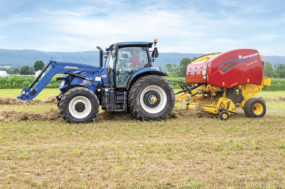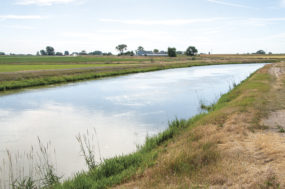Various forms of rust spores can overwinter in Missouri and can also be blown in from the south as temperatures warm. The “active” spores are called urediniospores and are produced from pustules that are formed on infected plants.
Pustules appear as a brownish lesion on plant stems, leaves and seed heads. The reddish/orange residue that rubs off onto clothing, boots and animal hair are the urediniospores.
One pustule can produce tens of thousands of urediniospores and each urediniospore has the potential to form a new pustule when it comes into contact with a droplet of water on a plant.
This cycle takes about two weeks and will continue as long as ample moisture and warm temperatures occur.
“Sparse and relatively minor cases of rust are common in Missouri. However, the heavy dews that we have experienced the last few weeks coupled with the minor winter seems to have increased the severity and range of the outbreaks,” said Menjoulet
Rust does not necessarily affect the overall quality of hay or pasture but it can make fescue harder for cattle to digest and can reduce forage yields.
Few, if any, cases of bronchial problems have been reported in cattle grazing rust-infected pastures and normal grazing routines can be followed.
However, producers should use caution when allowing horses to graze infected pastures or ingest infected hay. Horses could be more sensitive to inhalation of the spores.
Fescue seed yields can be reduced by as much as 40 percent when severely infected with rust due to lowered photosynthesis.
“Some producers may consider skipping fescue seed harvest all together and using these fields for hay or pasture,” said Menjoulet.
University of Missouri State Forage Specialists Dr. Rob Kallenbach and Dr. Craig Roberts also suggest cutting fescue for hay as soon as possible to avoid increased yield loss.
Fungicide applications can be made but the results may be unsatisfactory at this stage on maturing fescue stands. If fungicides are applied, pre-grazing and pre-harvest intervals must be followed as indicated on the label.
For more information, contact any of these MU Extension agronomy specialists in southwest Missouri: Brie Menjoulet in Hickory County at (417) 745-6767; Tim Schnakenberg in Stone County at (417) 357-6812; John Hobbs in McDonald County at (417) 223-4775; or Wyatt Miller in Barton County at (417) 682-3579. FG
—From University of Missouri Extension news release










